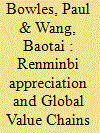| Srl | Item |
| 1 |
ID:
186218


|
|
|
|
|
| Summary/Abstract |
To identify the macroeconomic environment that has enabled China's industrial upgrading during a period of persistent renminbi appreciation, we construct a two-country New Keynesian model of industrial upgrading with a global production network, endogenous firm entry, and a directed quality frontier. We show that renminbi appreciation promotes industrial upgrading without hurting real economic growth in the longer run. This holds true especially through four channels. First, the quality threshold for firm entry is lower to allow for more firms participation and thus greater product varieties (quality threshold channel). Second, upstream skill-based production uses more imported inputs of higher quality (imported input channel). Third, there is substantial global demand towards the exports of high-quality inputs (global demand channel). Fourth, domestic inputs are competing against imported inputs to broaden the scope for competition in the upstream product market to incentivize quality upgrading (scope for competition channel).
|
|
|
|
|
|
|
|
|
|
|
|
|
|
|
|
| 2 |
ID:
157885


|
|
|
|
|
| Summary/Abstract |
China has experienced a rapid integration into Global Value Chains and a decade long appreciation of its exchange rate. However, these trends have been analysed largely in isolation from each other. In this paper, we explore the linkages between the two based on interviews with a sample of firms in Jiangsu Province. We show (1) how the distribution of the costs and benefits of exchange rate appreciation depends on the power hierarchies between firms in GVCs; (2) how exchange rate changes are important drivers of upgrading and even downgrading in GVCs; and (3) that the firm heterogeneity evident in GVCs provides additional insights into the politics of exchange rate determination in China.
|
|
|
|
|
|
|
|
|
|
|
|
|
|
|
|
| 3 |
ID:
120627


|
|
|
|
|
| Publication |
2013.
|
| Summary/Abstract |
This paper examines empirical evidence of the adaptive learning behavior of speculators in the 2005-2008 renminbi appreciation episode, and establishes a theoretical model to explore appreciation policy implications of such a behavior. In our model, speculators form their expectations about the future appreciation premium adaptively by extrapolating past appreciation returns into the future. We find that a rapid appreciation may attract more capital inflows, and the central bank may prefer a slow appreciation to discourage capital inflows. Simulated results can generate hump-shaped paths of the appreciation speed, expected appreciation premium, and capital inflows. In addition, changes in the appreciation speed precede changes in the expected appreciation premium and capital inflows. These results are consistent with empirical evidence in the 2005-2008 renminbi appreciation episode.
|
|
|
|
|
|
|
|
|
|
|
|
|
|
|
|